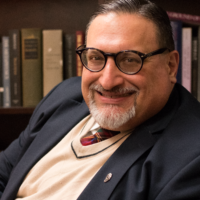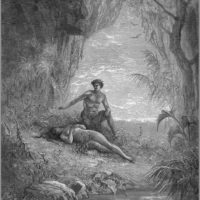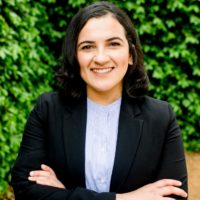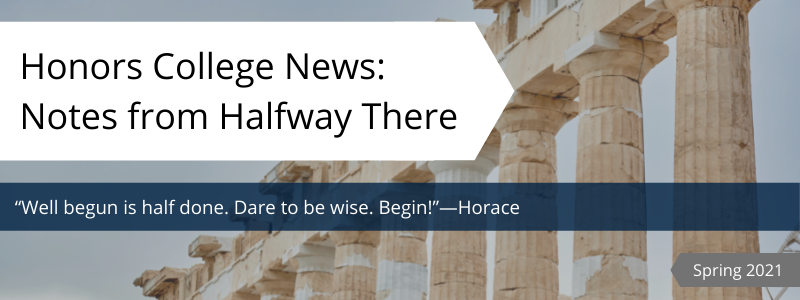
Honors College: News & Notes: Spring 2021
Dear Friends of the Honors College,
What, if anything, or who, if anyone, can provide the hope we need to live? The Honors College provides a feast of beautiful wisdom for its students, but can Honors Scholars find hope through studying the works set before them? I have been pondering these questions for the past few months, and the questions seem as urgent as ever. However, as I study history, these questions, or some version of them, turn out to be perennial. Our age and our societies are not special in their need for hope.
One place to look for hope is, of course, Socrates. In the midst of his great and declining Athens, Socrates seems optimistic. He seems to me to be thinking that, out in the agora, maybe today is the day I might meet someone by chance or divine providence and have a conversation that discloses the truths we need to live virtuously and well. Alas! He doesn’t always find such conversations or even people interested in having them. But he persevered even in the face of death. Why? What could give him such hope? Is it right to even call that hope?
Or consider any of the heroic figures we study: Achilles, Odysseus, Aeneas, Beowulf, to name a few. Maybe they can show us the way, either in word or deed. Alas.
Or perhaps some instruction might be given that we could learn and live by. Maybe Epictetus with his “some things are up to us, and some are not”? Or Hume with his “to the flames”?
So, then, what about Jesus? Is he any different? Can he provide hope where other people cannot? Christians have always answered yes, but what does it take to be genuinely persuaded that such an answer is true and to live one’s life in light of that genuine belief? In reply, Christians have emphasized that persuading ourselves of the genuine hope found in Jesus begins with a careful study of his words and deeds as recorded in the gospels and continues in an ongoing interactive relationship with him. Whether we try Jesus first or last or somewhere in between, those are the necessary starting points for any inquiry into the serious possibility that he can provide the hope without which we are daily, wordlessly terrified.
In the Honors College, we will always offer students the opportunity to begin from these things in order to live full of hope. This fall, we are eager to try something new to learn together about the nature and necessity of hope. During the usual lecture portion of the Honors College curriculum, we will bring together all Honors Scholars for a series of lectures on hope by the Honors College faculty. We look forward to lectures on Socrates and the other heroes we read about as well as the nature of hope as described by Tolstoy, Shakespeare, and the New Testament, to name a few. These lectures will be recorded and made available online for readers of this newsletter to watch. Our hope is that we can continue to provide resources like this for our Honors College alumni and friends.
Gary Hartenburg
Director, The Honors College
Houston Christian University
Featured in this issue of News & Notes:
Current Student: Nadine Ineza
 My name is Nadine, and I am from Rwanda. My family moved to the United States when I was about five years old. I’m majoring in computer science. I am also a member of TRIO (student support services) and a Hopper Fellow.
My name is Nadine, and I am from Rwanda. My family moved to the United States when I was about five years old. I’m majoring in computer science. I am also a member of TRIO (student support services) and a Hopper Fellow.
The computer science program is what originally brought me to HCU. The university is also close to home. My love for reading, along with my interest in Western history, are what drew me to the Honors College, and making a friend who was already in the Honors College during summer orientation was what ultimately led me to apply.
The Honors College has introduced me to people I might not have met on my own. Through each friendship, I have been introduced to a new perspective and have had some of my assumptions challenged. This has made the friendships I formed stronger and much more rewarding. I’m thankful for the discussions in the Honors College that allow people to express their opinions without worrying about others having a very negative view.
This summer, I am looking forward to partaking in an internship at Edge Energy Solutions and attempting to get certified in Java programming while also working on a small project on mobile applications.
Online learning this last year has made me appreciate in-person learning more because of how challenging some aspects of online learning were for me. I learned more about myself and my learning style through it, but, overall, I was glad I could come back to campus and do hybrid learning this spring.
I cannot pick just one single favorite book from the Honors College curriculum. Some of the ones that I enjoyed the most are Augustine’s Confessions and the City of God, Boethius’s Consolations of Philosophy, and Gregory of Nazianzus’s Five Theological Orations.
My favorite Honors College course would have to be the discussion seminars (despite having them very early in the morning). I see myself growing into the person that I aspire to be through each discussion. On top of that, I enjoy hearing others’ opinions on topics not commonly talked about so far in the conservations I have had.
Despite there not being an obvious and direct correlation between my major and the Honors College, being in the Honors College has made me think more critically about what I am learning in my major-specific courses. My advice to incoming students is to become friends with people they meet at HCU, no matter if they are in the Honors College, especially if they have a different perspective on the world. Additionally, make time in your busy schedule to take care of yourselves since there is no point in overworking to the extent that you burn out.
I hope my experience at HCU encourages other students that they can be in the Honors College while also being an engineering major. It might require more work than they initially expected, but they can do it. And it is worth it.
After I graduate from HCU, I hope that I have a better understanding of where I want to work in the technology field. I currently plan to work at a B Certified company or one that is working on their certification. Additionally, I plan to go back to school and get a masters degree in computer science and mathematics.
Reflections on Paradise Lost by John Milton
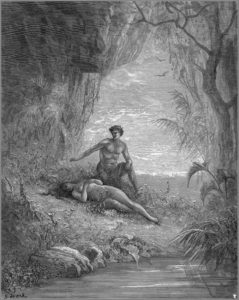 In John Milton’s Paradise Lost, just before that fatal first sin, Eve suggests to Adam that they work separately to increase the efficiency of their labors in the garden of Eden. Adam praises Eve for her desire to be productive, but then adds this word of caution:
In John Milton’s Paradise Lost, just before that fatal first sin, Eve suggests to Adam that they work separately to increase the efficiency of their labors in the garden of Eden. Adam praises Eve for her desire to be productive, but then adds this word of caution:
Yet not so strictly hath our Lord imposed
Labor, as to debar us when we need
Refreshment, whether food, or talk between,
Food of the mind, or this sweet intercourse
Of looks and smiles; for smiles from reason flow,
To brute denied, and are of love the food;
Love, not the lowest end of human life.
For not to irksome toil, but to delight,
He made us, and delight to reason joined. (PL 9.235-243)
This is a crucial passage, and one that touches upon several important themes in the poem. First, there is good work to do in unfallen Eden. Although after the Fall Adam’s curse includes laboring by the sweat of his brow, work in Milton’s Eden is an important, enjoyable, and rewarding part of Adam and Eve’s daily life. Of no less importance, however, is the need for rest. Adam categorizes rest according to three types of “food”: physical, mental, and social nourishment. These ways to rest—a gratefully received meal, a stimulating conversation, and loving interactions with others— are gifts from God, and intimately connected to purposeful living and to the “end of human life.” Using litotes, Adam emphasizes the importance of Love and the refreshment it brings. The food of love is produced by reason, “for smiles from reason flow,” and reason itself is “joined” to “delight.” For Milton, one might argue, the Fall begins with a belittling of the value of such rest and such nourishment. Implicit in that belittlement is a questioning of the goodness of the Giver. Honors scholars, this year you have been productive, and you have been busy. The summer has probably given you new ways to be both productive and busy. May this season be filled with nourishing, invigorating, loving, restful moments.
Written by Dr. Emily Stelzer
Faculty Feature: Dr. Robert Llizo
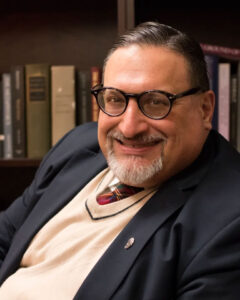 I earned my degrees at Biola University (BA, History, with a modern Europe focus, 1988), California State University, Los Angeles (MA, history, medieval and Renaissance Europe emphasis, 1991), and Claremont Graduate University (PhD, history, medieval Europe, with a focus on monasticism and mendicant movements, 2010). What brought me to HCU was an opportunity to teach in a newly reconstituted Honors College and also teach courses in the history department. I had been teaching in the Torrey Honors Institute (now the Torrey Honors College) at my alma mater, Biola University, from 1996 to 2013, and like Bilbo Baggins, I was ready for “a new adventure.”
I earned my degrees at Biola University (BA, History, with a modern Europe focus, 1988), California State University, Los Angeles (MA, history, medieval and Renaissance Europe emphasis, 1991), and Claremont Graduate University (PhD, history, medieval Europe, with a focus on monasticism and mendicant movements, 2010). What brought me to HCU was an opportunity to teach in a newly reconstituted Honors College and also teach courses in the history department. I had been teaching in the Torrey Honors Institute (now the Torrey Honors College) at my alma mater, Biola University, from 1996 to 2013, and like Bilbo Baggins, I was ready for “a new adventure.”
What I find unique about teaching in the Honors College is the sense of belonging to a community of learners, both faculty and students. I am a medieval historian by training, but I get to read a wide spectrum of works that span the curriculum, from Homer to Steinbeck and Eliot. I can confer with colleagues that specialize in these authors, and we share each other’s expertise and work in these fields. In the classroom, we collaborate with students in Socratic discussions on these texts, creating an atmosphere of learning that emphasizes community and walking together in seeking truth, beauty, and goodness.
If I were to pick one word that might best describe the importance of the works of Western civilization that we study in the Honors College, I would pick “humanity.” These works pose to us a fundamental question: What does it mean to be human? These texts help us reflect on that quintessential question, as we think about human experience in relation to society, the universe, and God. Frederick Douglass, upon reading some of these texts, discovered his own humanity, and once that happened, he realized he was not, and could never be, a slave.
The human drama has always held a fascination with me. From the time I was a young lad, I had always had a curiosity about how people in the past lived, loved, warred, and built their civilizations. How did they think about themselves in relation to their societies, and how did the events of their times shape them? How did they think about the life of the mind, their spiritual lives, and their relation to the divine, however they conceptualized it? What was their conception of the good life? These are the general questions I have asked from the time I was young, and they still yield a great treasure of insights.
There are many reasons why I find the study of history so important. First, we have to distinguish between history and what we might call “the past.” Many would define history as a “study of the past,” but that is part of the story. History, properly so-called, is a story put in narrative form by historians to make sense of the past events. Many of those narratives do in fact influence the way we see ourselves as a society. There is no doubt that Herodotus and Thucydides influenced not only historical writing as we know it, but also influenced the way the West thinks about history and society. These narratives have documented humanity’s triumphs and tragedies, and we have to accept both in order to understand ourselves critically.
If I could add one text to the Honors College curriculum, it would be Franz Kafka’s Metamorphosis. It can be read as a modern take on Ovid’s Metamorphoses, with some existential themes. The crucial question is which is the more important transformation, Gregor’s (who turns into an insect) or his sister Greta’s, who develops into a lovely lady. Is her transformation at the expense of Gregor’s? I struggle with this question every time I re-read it.
Everyone knows that I m a huge Dante fan, but I would like to take this space to talk about my great and abiding love for Boethius’s Consolation of Philosophy. Here is a man living in a critical age in crisis having been arrested for an act of treason he did not commit, a native of a city that at one time was the epicenter of a great empire, but now that empire has transcended it. Rome is a decaying city, run by Germans, but he is trying desperately to communicate the richness of the Greco-Roman world to a new people. The Consolation is a Job-like intellectual odyssey, beginning in despair, but then, from that place of depression and hopelessness, Lady Philosophy leads him into a journey of discovering what truly matters. He is able to tackle, in this short book, grand themes of fortune, providence, and the nature of time. He stands at the threshold between the classical Greco-Roman world and the medieval world.
One of my greatest joys in teaching in the Honors College is mentoring. There, I get to do more than make sure students are doing what they are supposed to be doing, but also engaging them in how these readings impact their daily lives, why they matter to them. The question we ask at every viva, “What have you learned about yourself, your peers, and God” is one that I try to ask my mentees, in varying ways, throughout the semester. It is my opportunity to get to know them as whole souls, beloved of God.
(When asked, which is better: California or Texas?) Ah! Now you are putting me on the spot! There is much that I love about both. Points for Los Angeles: the weather, the Huntington Library and Botanical Gardens, the Getty Center, the J. Paul Getty Museum (housing Greco-Roman art and built on the model of a Roman villa destroyed by the Mt. Vesuvius eruption in 79 AD), and last but not least, Pink’s Hot Dogs in Hollywood. Also, there are great pastrami sandwich places in east L.A. Points for Houston: a diverse city but which retains a sense of southern hospitality and politeness. The Houston Symphony. Houston Opera. The Fine Arts Museum. Great Cajun food (especially Boudreau’s Cajun Kitchen). I’ll take it all!
Honors College Alumna: Maryam Ghaffar
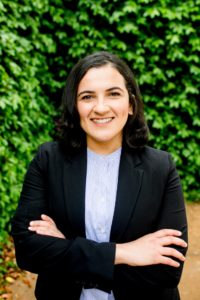 I am currently a law clerk at the Supreme Court of Texas working in the chambers of Justice John Devine. I graduated from the University of Houston Law Center last May in 2020. I just passed the Texas bar exam in October! At HCU I majored in government and minored in economics. I was photography editor at The Collegian, was heavily involved in the Honors College, was tech head for the Rex Fleming Players, and revived the South Asian Student Association on campus. After graduating from HCU, I was accepted into Teach for America and taught middle school at Pilgrim Academy in HISD for three years. All of these experiences have allowed me to grow into the person I am today.
I am currently a law clerk at the Supreme Court of Texas working in the chambers of Justice John Devine. I graduated from the University of Houston Law Center last May in 2020. I just passed the Texas bar exam in October! At HCU I majored in government and minored in economics. I was photography editor at The Collegian, was heavily involved in the Honors College, was tech head for the Rex Fleming Players, and revived the South Asian Student Association on campus. After graduating from HCU, I was accepted into Teach for America and taught middle school at Pilgrim Academy in HISD for three years. All of these experiences have allowed me to grow into the person I am today.
I landed at HCU because my late father was impressed by the faith-based curriculum and the close ties HCU has to the Houston community at large. He was a big part of me attending HCU even though we are Muslim and not Christian; he saw the benefits going to a faith-based school would have for me.
I was drawn to the Honors College because of the type of literature the curriculum boasted as well as the structure of the classes. Back in 2010, the structure wasn’t what it is today, but the Socratic method and discussion-based classes were all very appealing to me. I wanted to read about the human condition and spend my time learning how to think.
There aren’t enough good things I can say about the Honors College. That experience truly allowed me to be open to new ideas, new people, and different ways of engaging with others. When I was a middle school teacher, I was bombarded with so many students and each one came with their own individual needs. But I was able to translate the soft skills I learned at the Honors College into practical ways to help my students be successful. That may come in the form of empathy, compassion, or even grit (because let me tell you, getting through Aristotelian logic was not easy!).
Majoring in government meant I spent a lot of time reading founding documents, learning about the structure and foundations of the country, and also jurisprudence. All of that tied in very nicely with the Honors College curriculum and one complemented the other. In law school, my Honors College and government education helped me understand the foundations of our nation to truly appreciate why our legal system is built the way it is. I was also equipped with the skills to read difficult texts and come out the other side with a deep understanding of what the author wanted to convey.
The people and the professors are what I loved most about the Honors College. The people make any experience you have and I think from 2010-2013, the best of the best were at the Honors College at that time. From our fearless leader Dr. Stacey to Melanie on the office staff, every person truly cared about one another, and we were a close-knit family. No matter how difficult your assignments were, you knew you had a friend to lean on through it all.
Since graduating, I have actually reread Mere Christianity. The Honors College was impactful because it strengthened my own Islamic faith and once in a while when I have questions about faith, I do enjoy reading the Christian perspective on things to see what is said on the subject. I find it helps me understand the Christian perspective but solidifies my belief that there is more in common with Islamic and Christian beliefs than the media these days would have people think.
There are so many things about faith that the average person does not think about or delve into. This is most likely because we grow up following practices and do as we are told. Once you start asking the hard questions like, “Why do bad things happen to good people?” you start actually learning more about your own faith and beliefs. Even though much of the reading in the Honors College was Christian-focused, the same questions we asked about faith in class allowed me to look inward and seek guidance about my own Islamic faith. It was truly a great experience to apply what I was learning and thinking about in class to my own real-world experience in real time.
If I could add one book to the Honors College curriculum, I think it would be a book that does a deep-dive, neutral comparison on Judaism, Christianity, and Islam. For a school that prides itself on molding independent thinkers, it is necessary to be well versed in all aspects of religion, not just one part of it. I felt many of my classmates at the time were lacking basic knowledge on both Judaism and Islam, something I think they would have benefitted from overall.
To undergraduate students, I would say, make sure you get a liberal arts education. Those soft skills are what make you successful later on. To graduating seniors, I would add that your pedigree matters less than your perseverance. Keep going.
After my clerkship at the Supreme Court of Texas, I will be clerking for Judge Brown, a federal district court judge in Galveston. After that, I plan on entering private practice in Houston.
Want More News & Notes?
Subscribe to the Honors College Newsletter to receive updates in your inbox!
Honors College Alumni can update their contact information by completing the Honors College Alumni Survey.

